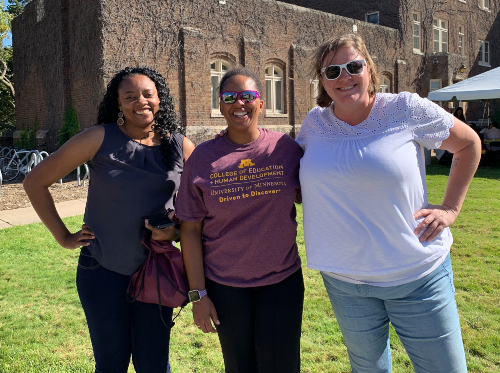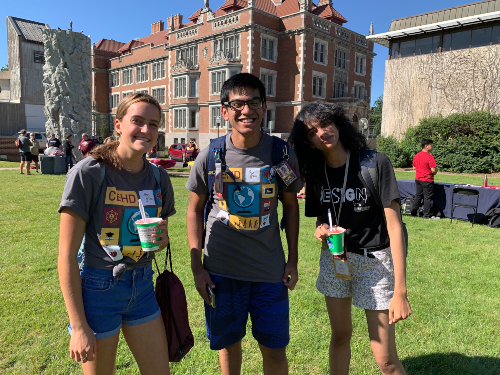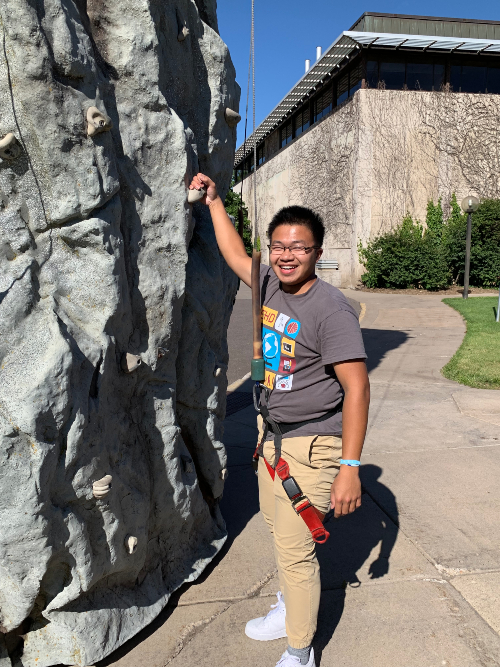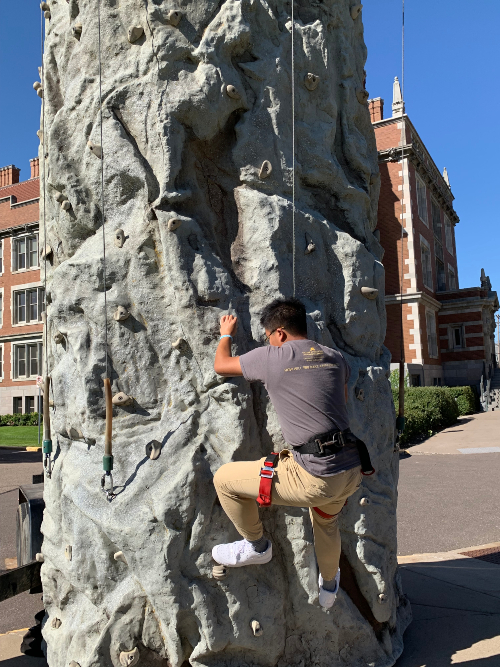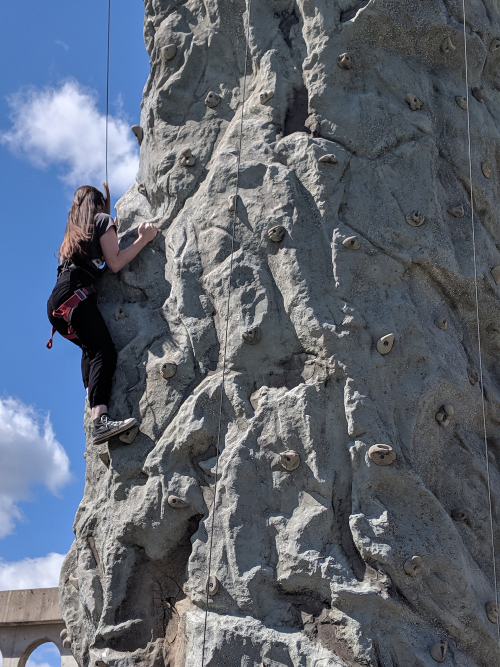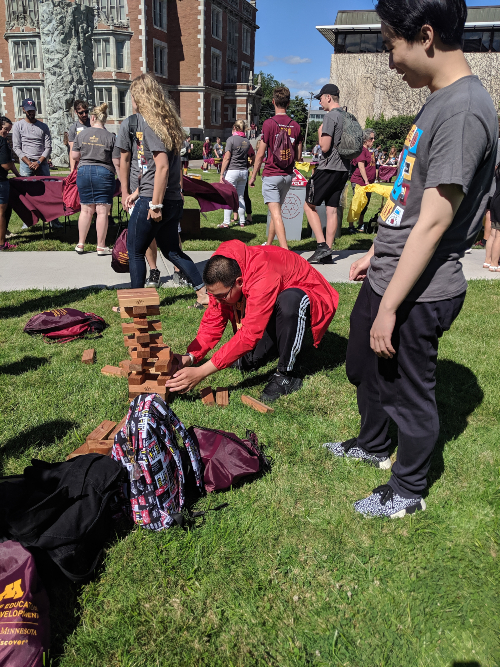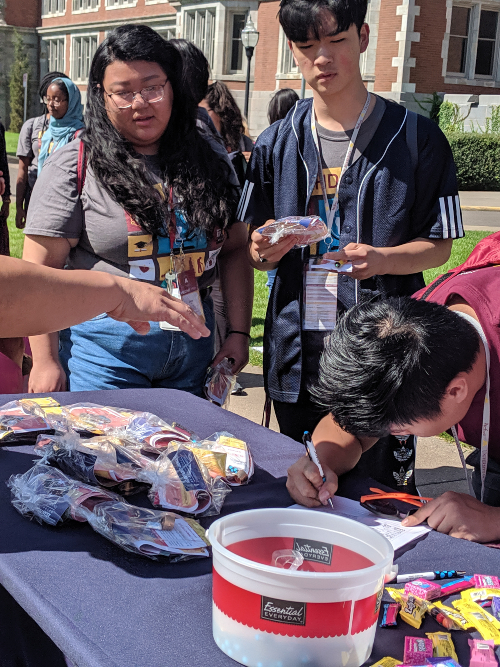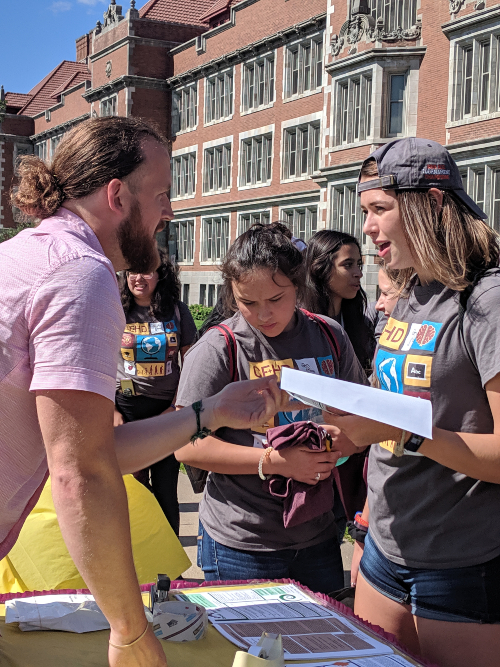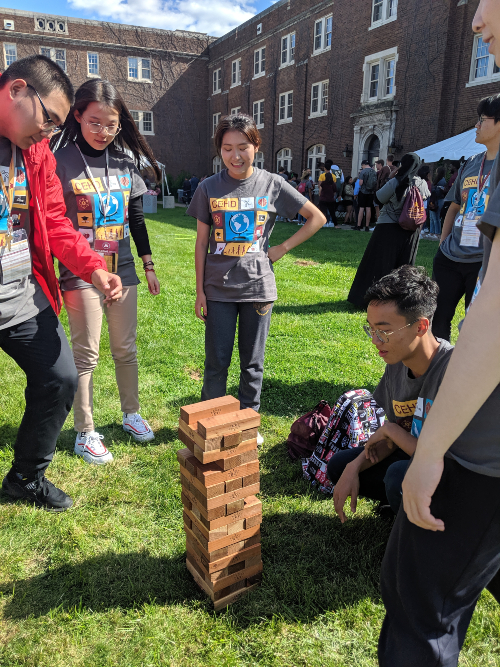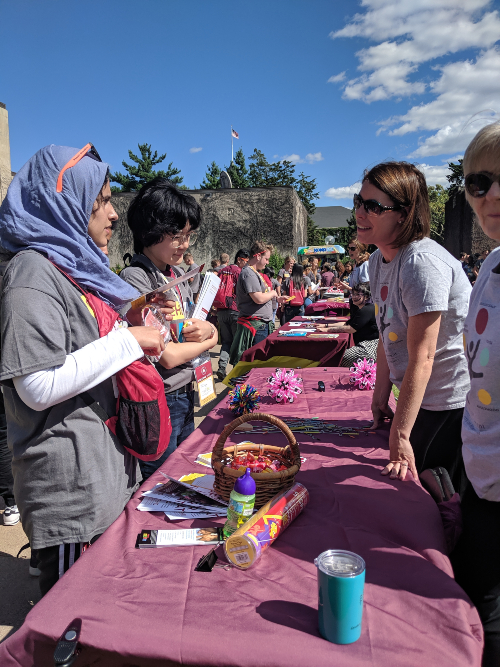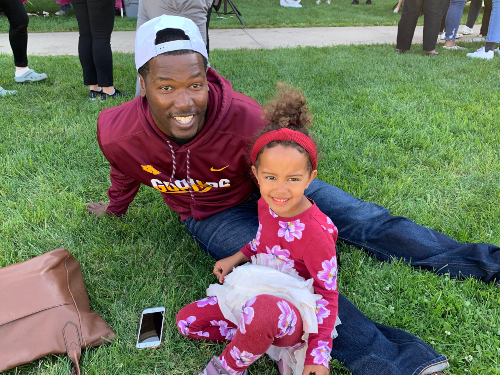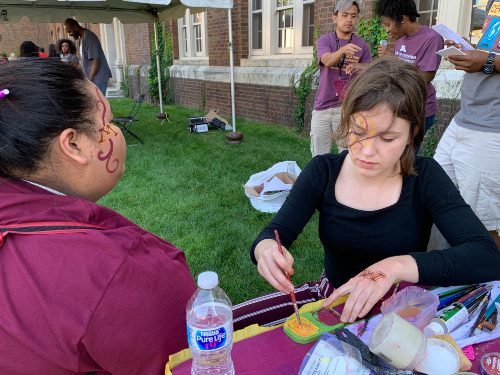The Minnesota Center for Chemical and Mental Health (MNCAMH) has changed its name to the Center for Practice Transformation. The new name reflects the center’s focus on conducting research and evaluation and educating and empowering practitioners to provide exceptional care to individuals affected by mental illness, substance use, and co-occurring disorders. The center is a part of the School of Social Work. Read more.
Elizabeth Sumida Huaman edits journal special issue on Indigenous women and research
A special issue of the International Journal of Human Rights Education (IJHRE), edited by Elizabeth Sumida Huaman (Wanka/Quechua), Department of Organizational Leadership, Policy, and Development, recently launched. The issue, “Indigenous Women and Research: Global Conversations on Indigeneity, Rights, and Education,” is free to view. The issue contains articles by Indigenous women from around the world representing issues that intersect with Indigenous rights, including environment, language, health, and schooling.
IJHRE provides a forum for for human rights education with a dynamic and democratic platform for debates, ideas, and lessons from engaged scholarship and practice. “The journal has a socially transformative vision and amazing editorial staff committed to bringing forward stories like those shared by our authors,” Sumida Huaman said.
All individual articles are available for free download, and readers can also access a complete PDF of the issue, which Sumida Huaman points out can be used as a textbook uniquely authored by Indigenous women. Also available is a FreshEd podcast with Sumida Huaman and her co-editor, Tessie Naranjo (Tewa), to discuss the special issue.
Leading the discussion on open education
Today, senior education leaders from 12 states gathered at the Campus Club for a day-long seminar focused on sustainably supporting open education. Led by experts from the Center for Open Education’s Open Textbook Network (OTN), the aim is to increase understanding of this quickly growing area in higher education, support institutional transformation, and sustain growth of open education programs.
In order for open education initiatives to last, they must be sustainable, multi-layered, and enjoy not only grassroots but also administrative support. While many open education initiatives have begun as projects and pilots, the case for developing lasting, integrated institutional, consortial, and state-wide programs is starting to be made. This seminar will focus on giving decision-makers an overview of open education, why it matters and to whom, and ways they can support and sustain its growth.
“The seminar is an opportunity for higher education decision makers to see how open education can help make education more inclusive, increase retention, and improve affordability,” said David Ernst, executive director of OTN. “We’ve trained over 5,000 faculty, librarians, and staff nationally, and we’re excited to share our expertise with institutional leaders who have the power to make programmatic changes at their institution.”
OTN is an alliance of higher education institutions that advance open education by empowering its members to take collective responsibility for course content through proven practices, verifiable results, and community support. The network supports more than 110 members who represent more than 1,100 campuses nationwide.
The seminar leverages the OTN’s expertise in building open education programs. It also aligns with the Midwestern Higher Education Compact’s (MHEC) focus on serving higher education across the Midwest. A co-host of the seminar, MHEC is a 12-state legislatively created compact that creates solutions that build higher education’s capacity to better serve individuals, institutions, and states by leveraging the region’s resources, expertise, ideas, and experiences through multi-state convenings, programs, research, and contracts.
“In 2018 we brought together Open Education Resources (OER) champions from all 12 MHEC states so they could learn from and inspire each other’s work at a grass-roots level,” explained Susan Heegaard, MHEC president. “Their work has resulted in significant increases in the use of OER across the region, which has saved millions of dollars for Midwestern students and their families. Now in 2019 the time is right to convene institutional and system leaders from those same states so they can learn how to support these efforts and implement OER systematically. We are excited about the quality and the speed with which OER work in the MHEC states is unfolding.”
Welcoming the attendees at the invitation-only event were Heegaard and University of Minnesota’s Executive Vice President and Provost and MHEC Commissioner Karen Hanson.
CEHD announces Distinguished Alumni Award winners
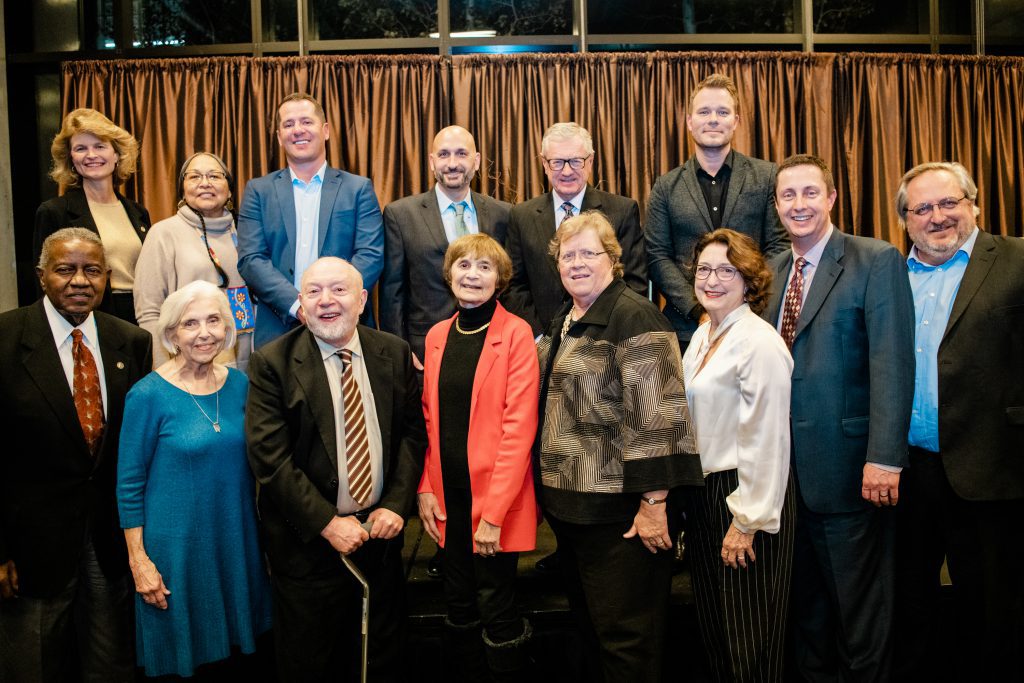
Winners of the 2019 CEHD Distinguished Alumni Awards were recently announced. The award honors CEHD alumni who have excelled in their fields and contributed greatly to their communities. Award recipients belong to a wide range of academic disciplines and career paths, but all are individuals who have made profound impacts in the lives of children, youth, families, schools, and organizations, and whose achievements bring honor to the college. The awards were presented November 21 at the McNamara Alumni Center.
The winners include:
Keith Ballard, BS in sports studies, 2016. Ballard played 10 years in the National Hockey League (NHL), including an appearance in the Stanley Cup finals with the Vancouver Canucks and finishing his career on the Minnesota Wild. While a student at the U of M, he played on two NCAA national championship teams and was a finalist for the Hobey Baker Award, given to the top college men’s ice hockey player.
Linda Cohen, MA in educational psychology, 1985; PhD educational psychology, 1986. Cohen earned her PhD as a mid-career change. She became a licensed psychologist, practicing for 20 years. In her previous roles, she taught at Blake School and became the director of the middle school. She also led a major partnership with Henry High School and TCF Bank. This spring, she completed a 12-year term on the University of Minnesota Board of Regents, including a two year term as chair.
Penny George, MA in educational psychology, 1972. George co-founded Sellergren-George Consulting Psychologists, where she helped senior executives select for and build high-performing teams. Today she is board chair of the George Family Foundation and a leader in the national movement to transform medicine and healthcare through the principles and practices of integrative medicine. She also serves on the board of the foundation that supports the Penny George Institute for Health and Healing at Allina Health in Minneapolis.
John Hoffman, MA in educational administration, 1997; PhD in educational administration, 2000. Hoffman has been the vice chancellor for academic and student affairs at the University of Minnesota Crookston since July 2018. He previously worked at California State University, Fullerton; Cal State Long Beach; and Concordia University in Irvine, in roles including dean of students, professor, department chair, and doctoral program director. John has built a record of growing and diversifying student enrollments, promoting educational equity, and increasing faculty and staff diversity.
Bradford Hosack, MA in curriculum and instruction, 2010. Hosack, a lifelong learner, educator, and inventor, is dedicated to changing the way students learn through the design and development of educational software. As a graduate student in CEHD, he teamed up with Charles Miller to co-create Flipgrid—a video platform for recording and sharing student voices. Hosack is currently vice president of engineering and product technology for Carnegie Learning.
Charlie Miller, PhD in curriculum and instruction, 2007. Miller helped to establish and lead the Institute for Design Innovation in CEHD, now known as Educational Technology Innovations or ETI. His early groundwork positioned CEHD as a pioneer in sharing research-based best practices and interventions with teachers. He co-founded Flipgrid—a video platform for recording and sharing student voices which was acquired by Microsoft in 2018. Today, he is partner general manager of Flipgrid at Microsoft.
Alice Moormann, BS in art education, 1960. Moormann has dedicated more than five decades to the important work of voter education and participation in democracy. She became a volunteer with the League of Women Voters Minneapolis at the time of the Vietnam War as a way to learn more about the political process. Since then she has served in many positions for the Minneapolis and statewide leagues, including volunteer coordinator, nominations chair, and co-president twice.
Steven Permuth, BS in mathematics, 1966; PhD in educational administration, 1977. Permuth’s career as an educator began at North High, where he was a math teacher after completing his bachelor’s degree. He returned to the U and earned a doctorate in educational administration, which led him to faculty and administrative roles at three universities. Today, he is a professor at the University of South Florida, where he also served as dean of the College of Education.
Randall Peterson, BS in agricultural education, 1986; MA in educational psychology, 1990. Peterson is professor of organizational behavior and director of the Leadership Institute at the London Business School. He is an internationally known expert in leadership, team and board dynamics, and conflict management. With a non-traditional background as a social psychologist in a business school, he has conducted research on how chief executive officer personality can affect organizational outcomes; leadership of diverse teams; and board effectiveness.
Iris HeavyRunner-PrettyPaint, MSW in social work, 1997; PhD in social work, 2009. HeavyRunner-PrettyPaint is an internationally recognized expert in Native cultural resiliency and Indigenous evaluation methods. A member of the Blackfeet/Crow tribe, she has more than 35 years of experience as a researcher, evaluator, and educator, and is currently vice president for project management at Kauffman & Associates, an American Indian- and woman-owned management consulting firm. She has a longtime interest in building resilience and persistence for Native students pursuing higher education.
Martha Russell, MA in home economics, 1976; MA in family social science, 1976; PhD in educational administration, 1983. Russell is executive director of mediaX at Stanford University and a senior research scholar at the Stanford Human Sciences and Technology Advanced Research Institute. She is an innovation orchestrator who has established collaborative research initiatives and technology leadership in information communication technologies for national agencies and for technology companies. She also serves on several editorial/advisory boards and has started and advises several startup companies.
Ryan Saunders, BS in sports studies, 2008. Saunders is the head coach for the Minnesota Timberwolves men’s basketball team. As a U of M student-athlete, he played for the Gopher men’s basketball team, where he was a two-time captain, four-time scholar-athlete award winner, and a 2006 Big Ten All-Academic selection. After receiving his bachelor of science degree, he served as an assistant coach for the Washington Wizards and as head coach for Minnesota’s Las Vegas Summer League entry.
Roscoe Smith, PhD in educational administration, 1972. Smith had a 40-year career as a classroom teacher, youth leader, and administrator focused on supporting students and encouraging family involvement. He was the first African American male to be promoted from teacher to an administrative position with the Dallas Independent School District. He designed and implemented the district’s first Central Parent Advisory Council, which was recognized as a national model, and later founded the Texas Parent Coordinating Council.
Katherine Tunheim, PhD in work and human resource education, 2008. Tunheim is an expert in organizational behavior, human resource development, and strategy. She had a 25-year career in the corporate sector, managing training and leadership programs at three different companies and running her own consulting firm. After earning her PhD, she joined the faculty of Gustavus Adolphus College, teaching courses on public speaking, management principles, and leadership. She recently was named the inaugural vice president for mission, strategy, and innovation at Gustavus.
David Vick, BS in elementary education, 1967; MA, Educational Administration 1973; PhD Educational Administration 1987. Vick’s career included roles as teacher, program coordinator, principal, assistant superintendent, and superintendent. He is particularly proud that as superintendent in Lake Bluff, Illinois, he helped passage of a building referendum, resulting in selling one outdated school, tearing down two old buildings, constructing a LEED-Certified elementary school, and remodeling the middle school.
New developing brain institute is focus of Discovery Showcase

Dean Jean Quam was a featured guest at the 2019 Discovery Showcase yesterday at McNamara Alumni Center. The showcase is a premier University of Minnesota Foundation annual event that showcases U of M innovations. This year’s theme was “The Wonder Years: How Young Brains Build Connections for Life.”
The event began with a reception featuring medical enterprise experts at exhibits in four rooms. Those experts from CEHD included Gerald August, Jed Elison, Megan Gunnar, Amy Hewitt, Ann Masten, Megan Patrick, Frank Symons, Kathleen Thomas, and Philip Zelazo.
During the main program, Quam, along with Medical School dean Jakub Tolar, talked about a new, first-of-its-kind institute devoted to the developing brain. The institute, a collaboration between CEHD and the Medical School, will focus on three areas: clinical research, clinical services for children and families, and policy/outreach, with the outcome being better diagnosis and treatment of neurological disorders in childhood and adolescence. Specifically, the institute will address such conditions as autism, ADHD, learning disorders, drug addiction, anxiety, depression, and teen suicide. “I am confident that what we bring to the table will help shape real-world practices that affect all children and families,” Quam said.
The proposed site of the institute is at the Shriners Hospitals for Children located near the Twin Cities campus on East River Parkway. “The Shriners campus offers an easy-to-access, serene, welcoming setting with family friendly architecture,” Quam said. “It’s essentially a one-stop shop designed to enhance children’s and teen’s brain development and long-term health.”
Gov. Walz visits ICD building on first leg of public project tour
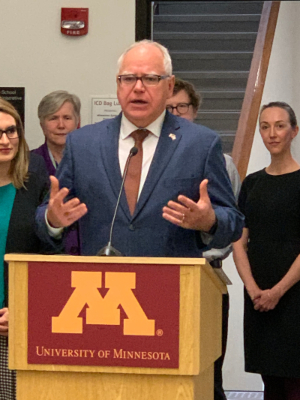
The Institute of Child Development (ICD) welcomed Minnesota Governor Tim Walz, Lieutenant Governor Peggy Flanagan, and Minnesota Management and Budget Commissioner Myron Frans this morning as the trio embarked on a tour of proposed public building projects around the state.
“It’s going to be an exciting time,” Walz said. “It lets us get on the ground and make some assessments on these projects.”
The projects, requested by various state and local entities, are vying to be funded next year. Walz and his team plan to visit the sites of all of the projects to determine which ones he will request funding for from the legislature.
“Now is the time for robust community projects across the state,” Frans said. “Last week I was with the National Association of State Treasurers and, discussing the low interest rates, they said right now the key and smart investments are for states to fix their infrastructure and assets.”
One of the projects is the building that houses ICD. Constructed more than 100 years ago and last renovated in 1960, it is structurally not up to the standards of a modern university. CEHD is seeking $29.2 million from the legislature for a $43.8 million building renovation. The remaining funding needs will come from private gifts.
The ICD renovation project was not new to the governor’s office. “This project was in our bill this year, so we recognized this right away,” Frans said. Walz concurred, indicating that ICD had a place in his funding request. “There’s a reason we’re here,” he said. “I don’t think I’m letting anything slip here that this project will certainly be in there. That’s why we started here.”
Support the Community Fund Drive
The Community Fund Drive, which benefits seven local nonprofit partners, is now underway. There are many ways to participate:
- Send a “Boo Gram” to a colleague – stop by the dean’s office to send a candy-gram-like “Boo Gram” ($1 or six for $5) to anyone in the Knoll Area, Cooke Hall, Peters Hall, or the LES Building. Deliveries will take place each Wednesday starting today.
- Soup-er Spooky Cook-off – Chefs and soup enthusiasts are being sought to participate in CEHD’s Soup-er Spooky Cook-off, to be held in Burton Hall on October 29 from 11:30 a.m. to 1 p.m. Prizes will be awarded for Best Chili, Best Soup, Best Veggie, and Best in Show. Register.
- Make a gift to the nonprofit of your choice – You can schedule a payroll deduction via the new eWay system or download and print a pledge form.
Umbreit named among top 50 social workers in U.S. history
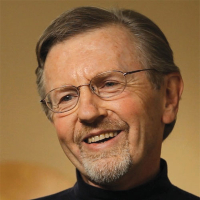
Professor Mark Umbreit, School of Social Work, has been ranked among the top 50 most notable social workers in U.S. history by the International Association of Schools of Social Work (IASSW). The list is chronological by date of birth; Umbreit is #48. The rankings are based on the quality and impact of the person’s work. Umbreit received his PhD in Social Work from the University of Minnesota. His three decades of work have focused on restorative justice, indigenous justice and healing, human rights, victim services, criminal/juvenile justice, peacemaking, spirituality, forgiveness, reconciliation, mediation, conflict resolution, and social change. He has provided lectures, training, and consultation in nearly every state and more than 25 countries on every major continent. His 11 books and more than 200 other publications have had a major impact on criminal justice policy in the U.S. and other countries. His training films and publications have been translated into many languages. Mark’s recent work has been with the United Nations Development Program in the Islamic Republic of Turkey and in Brazil.
Umbreit is the founding director of the Center for Restorative Justice & Peacemaking in the School of Social Work. He serves on the faculty of the Center for Spirituality & Healing in the Academic Health Center at the University of Minnesota, teaching courses on “Peacebuilding Through Mindfulness Practice,” and “Forgiveness & Healing.” He also serves as a visiting professor at the Marquette University Law School in Milwaukee, teaching a course on “Peacemaking and Spirituality.” In past years, he has also served as a fellow of the International Centre for Healing and the Law, and a fellow of the Center for Contemplative Practice in Society.
As a practitioner, he periodically facilitates peace-building circles in the community, and restorative dialogues between family survivors of homicide or other victims of severe violence and the offender in their quest for healing and strength. Over recent years he has worked with colleagues in Northern Ireland, Italy, Liberia, and Israel/Palestine on peace building initiatives.
Umbreit has provided technical assistance and training in support of restorative justice initiatives and victim offender mediation/conferencing programs in hundreds of communities in the U.S. and many countries. His multi-site and multi-national research has contributed significantly to restorative justice policy development in the U.S. and other countries, as well as providing resource materials and guidance to practitioners. He recently worked as a senior international consultant with the United Nations Development Program and the Ministry of Justice in Turkey to support their legislative efforts to implement victim offender mediation throughout the country. At the National Restorative Justice Conference in June of 2013 he was elected the founding president of the new National Association for Community and Restorative Justice in the U.S. and was re-elected to a second term.
CASCW to partner with state for training academy
The culmination of several years of work in the legislature has resulted in a fully executed Joint Powers Agreement between the MN Department of Human Services (DHS) and the University of Minnesota. DHS’ existing child welfare training system will partner with the School of Social Work’s Center for Advanced Studies in Child Welfare (CASCW) to co-create a statewide Child Welfare Training Academy. The first-year funding of $2.25 million will support training activities, staffing, and the acquisition of a new centralized training space.
The four-year development period will include critical involvement from counties, tribes, providers, community members, and a myriad of interdisciplinary professionals. It will result in new supervisor training, revised and enhanced new worker training, and more robust offerings of advanced practice training. Professionals’ ability to work effectively cross-culturally and a targeted focus on addressing bias, discrimination, and the tremendous racial disparities within the system will be a core element throughout all aspects of training.
CEHD’s education program ranks fourth among the Big 10 schools
CEHD’s education program ranks fourth among the Big 10 schools, according to the Academic Ranking of World Universities (ARWU) 2019 report. Overall, CEHD placed 15th in the world among the 500 ranked schools in the new list.
ARWU is published by the ShanghaiRanking Consultancy, a fully independent organization dedicated to research on higher education.
ARWU uses six objective indicators to rank world universities, including the number of alumni and staff winning Nobel Prizes and Fields Medals, number of highly cited researchers selected by Clarivate Analytics, number of articles published in Nature and Science, number of articles indexed in Science Citation Index—Expanded and Social Sciences Citation Index, and the per capita performance of a university. More than 1,800 universities are actually ranked by ARWU every year.
Provost comments on Dean Jean Quam’s retirement plans
Executive Vice President and Provost Karen Hanson responded to Dean Jean Quam’s retirement announcement on September 23:
“I write to follow up on the message that Dean Jean Quam sent earlier today, informing you of her decision to step down as dean on August 1, 2020. Please join me in extending deepest appreciation to Jean for her leadership of the college over the past ten years.
“Jean has served both the college and the University with distinction. When she assumed the deanship in 2009, the existing College of Education, College of Human Ecology, and General College had been newly brought together as CEHD; the college was only beginning to define its vision and had not yet embarked on critical strategic planning. Under her leadership, CEHD has made great strides in achieving its vision of increasing opportunities for all individuals across their lifespans, and it is positioned exceptionally well for the future.
“For example, CEHD is pursuing groundbreaking research in educational equity, autism, wellbeing and aging, and children’s mental health. Additionally, CEHD has partnered with the Medical School to propose a new interdisciplinary Institute of Child and Adolescent Brain Health. Jean has also overseen the building of a collaborative, respectful, and inclusive college culture, where diversity among the faculty, staff, and the student body is a priority and a strength.
“CEHD is now on solid financial footing, in part through Jean’s encouragement of innovation and technology that has led to new revenue streams, as demonstrated by the recent sale of Flipgrid to Microsoft. The college is also well ahead of schedule on its expanded campaign goal of $100 million.
“I am grateful that CEHD will continue to benefit from Dean Quam’s leadership for the next several months as the search for a new dean gets underway. I expect to launch a national search later this fall, with the aim of having the next executive vice president and provost name the new dean by the latter part of next spring semester.
“The support and engagement of the CEHD community will be vital to the success of this search, and so I invite your nominations of faculty, staff, and students to the search committee. The committee will shape the position profile for the new dean and ensure a strong and inclusive search process. Please send nominations for the search committee, including a brief word or two in support of the nomination, to provost@umn.edu by October 18. I will follow up later in the semester to outline next steps.
“Again, I extend my deepest appreciation to Jean for her exemplary service to CEHD and the University. She has kept a steady focus on the college’s vision and priorities, moving it into a position of strength. I also want to thank her personally for the excellent counsel she has provided me over the years. I am truly grateful for all she has accomplished, and I am grateful too for all the outstanding work you are all doing, under Jean’s leadership, on behalf of the college and the University.”
Dean Jean Quam announces retirement
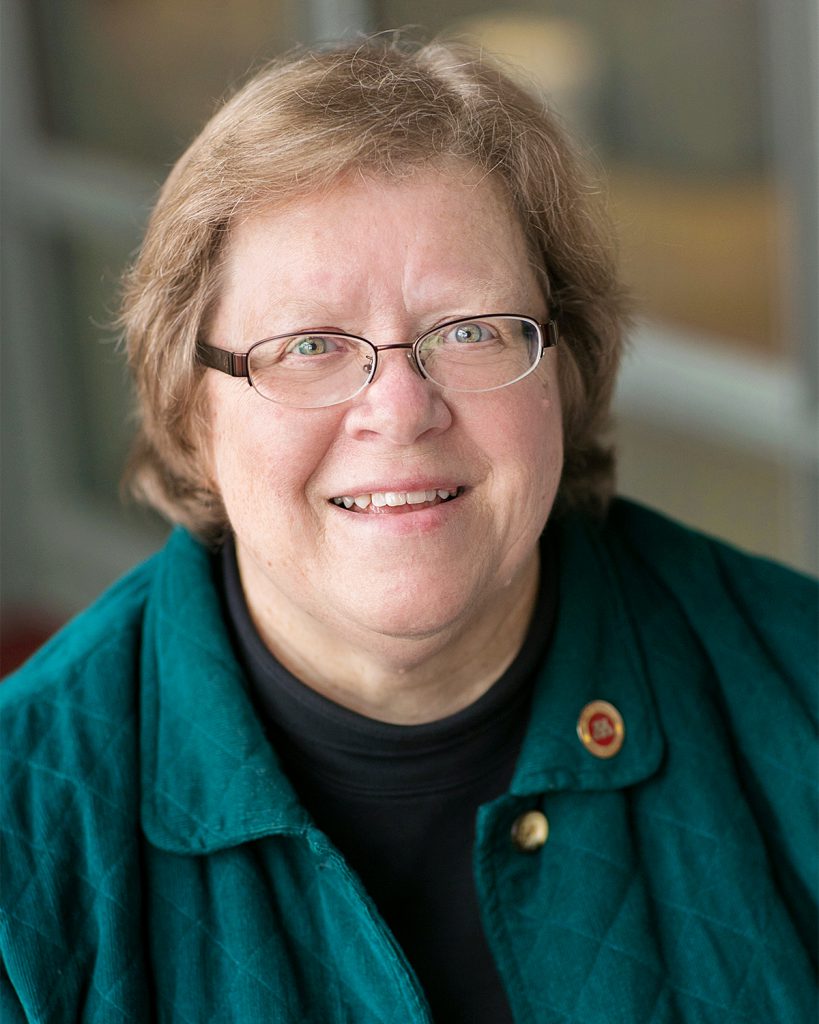
In a September 23 message to the CEHD community, Dean Jean Quam wrote:
“As I worked on my talk for the Fall Assembly and thought about our Vision 2020 efforts, I am very proud of the work that we have done over the past few years to create a great college. In 2006, I co-chaired a committee that planned for bringing the School of Social Work and Family Social Science together from the College of Ecology with the existing College of Education and General College to form the new CEHD. I have had the privilege of being the senior associate dean, the interim dean, and the dean of this amazing college. It could not be in better shape to hand it over to a new leader.
“Earlier in the summer, I asked Provost Hanson to accept my resignation as dean of CEHD and she asked me to think about it carefully. After much reflection, I would like the change to be effective August 1, 2020. I plan to take a sabbatical during fall semester 2020, and then return to my position as a full professor in the School of Social Work and begin a phased retirement. I have always thought that it is a privilege to be a faculty member and I would like a few more years to enjoy that opportunity.
“I was hired at the University of Minnesota in February 1980. I was expected to have completed my PhD in social welfare and begin work as an assistant professor by the fall quarter. But I became very involved in a strike with fellow teaching assistants in Wisconsin and came to Minnesota as an instructor until I could complete my dissertation. That first quarter, I taught three new preps and finished and defended my dissertation. Every year since that first quarter has been filled with great experiences. My many opportunities and my many friendships have been a gift during my more than 40 years at the U of M.
“I have accomplished many of the goals we laid out for CEHD. Our research productivity has never been stronger, and I am proud of our work to establish the Learning Informatics Lab, the new Institute for Child and Adolescent Brain Health with the Medical School, the unified Lab School, and the new ICD building. We have advanced the entrepreneurial efforts of many of our faculty and created products that have significantly improved the use of educational tools. We are significantly more diverse and global in our faculty, staff, and students, as well as our teaching, outreach, and research. And lastly we are financially sound now and into the future.
“I thank each of you for your support of my leadership. I wish you all the best and look forward to a productive year and eventually joining you as a colleague in CEHD.”
ICI staff present at disability conference in Scotland
In August, Institute on Community Integration staff members moderated breakout sessions and/or presented at the 2019 World Congress of the International Association for the Scientific Study of Intellectual and Developmental Disabilities (IASSIDD) in Glasgow, Scotland.
Brian Abery presented “Outcome Measurement in the U.S. for Persons with IDD: Current Status and Development of Person-Centered Measures.”
Amy Hewitt moderated breakout sessions on “Building and Sustaining a High Quality Direct Support Workforce” and “Self Direction for People with Intellectual Disabilities: What Have We Learned.” She also presented “2018 New York State Workforce Credentialing”; “National Core Indicators Staff Stability Survey Data”; “The Effects of a Competency-based Training Intervention for Direct Support Professionals on Site-level Outcomes, Learner Outcomes, and Service Recipient Outcomes”; “FINDS: Family & Individual Needs for Disability Supports Survey”; and “Implementation of Self-direction in the U.S.: Lessons and Policy Implications.”
David Johnson moderated the breakout session “Postsecondary Issues: Inclusive Education and Employment” and presented “Predictors Associated with Paid Employment Status of Community and Technical College Students with IDD in the USA.”
Jerry Smith screened the film he directed, Invaluable: The Unrecognized Profession of Direct Support.
Renáta Tichá presented “Progress Monitoring System for Students with Significant Cognitive Disabilities—MANGO.”
CEHD 2019 Block Party welcomes in new school year
Fun, food, and free stuff were the order of the day at the August 29 CEHD Block Party in Nolte Plaza. The block party is CEHD’s annual event to welcome in the new school year, meet old and new friends, and show college pride.
Announcing CEHD Bowling Tournament Winners
Pins were flying at the fourth annual CEHD Bowling Tournament Thursday, August 8, in Goldy’s Gameroom. Eighteen teams came to vie for the best average team score as well as best costume. Once the dust settled after an intense afternoon of strikes, spares, and splits, it was clear to everyone that it was a great way to spend time with CEHD colleagues.
Having the highest average team score were the High Rollers (468) and I Can’t Believe It’s Not Gutter (444). Members of the High Rollers include Patrick Doble, Nicole Shopbell, Michael DallaValle, and Schee Moua. I Can’t Believe It’s Not Gutter includes Lucy Evans, Andy Bartus, Max Webb, Jeff Zytkovicz, and Daniel Peterson. The highest individual score winners were Jessica Baltzley (143) and Matt Smriga (145). Teams having the best costume were the Cowbowlers (Jennifer Schneider, Katie Kickhafer, and Tali Levin) and the Purple Lanes (Sheri Beck, Anna Mraz, Rita Richardson, Jamie Schumann, Ian Turnage-Butterbaugh, and Don Riley.
The other competing teams include:
- Bowl LPD (Alex Evenson, Jeremy Hernandez, Alissa Jones, Daniel Koza, and Kevin Ly)
- Ed Psych Strikers (Rachel Brovold, Lesa Clarkson), Alicia Vegell, and Andrew Zieffler)
- ETI (Shannon Mayer, Jessica McLain, Todd Williams, and Ashley Wright)
- FSoS Flyers (Anna Brenk, Sarah Dohm, Julie Michener, Steve Pearthree, and Nikki Wakal)
- HR Bowlers (Mark Demulling, Rachel Domazeck, Allie Jonas, Christal Vang, and Amy Yang)
- Kinesiology (Miriam DeRoode, Bob Janoski, Michael Klecker, Jonathan Sweet, Gao Thao, and Brittany Vickers)
- Magic 8 Bowls (Brittany Barber, Ann Dingman, Holly Hartung, Jireh Mabamba, and Matt Smriga)
- No Mercy (Rayla Allison, Sherri Boone, Susan Holte, Obafemi Ogunleye, Jean Quam, and Mani Vang)
- Pro-CEED (Karen Anderson, Ann Bailey, Alyssa Meuwissen, Ashley Midthun, and Deb Ottoman)
- The Rock ‘n’ Bowlers (Jessica Baltzley, Nik Fernholz, Gretchen Gallagher Weinstein, and Amy Kurowski-Moen)
- Splitting on an Angry Spare (Nathan Kopka, Michael Rodriguez, Frank Symons, and Ryan Warren)
- SS Winners (Carole Anne Broad, Darron Sherrill, Tasia Tigue, and Betty Yang)
- SSW Dream Team (John Bricout, Joe Merighi, Megan Morrissey, Heidi Presslein, James Reinardy, and Lynette Renner)
- Strikers (Anthony Albecker, Kayla Cory, Amani Stumne-Berry, and Bai Vue)
Thanks to everyone who took part in the fourth annual CEHD Bowling Tournament. It’s not too early to start practicing for next year.
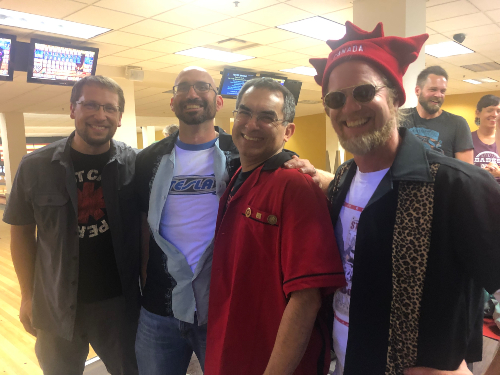





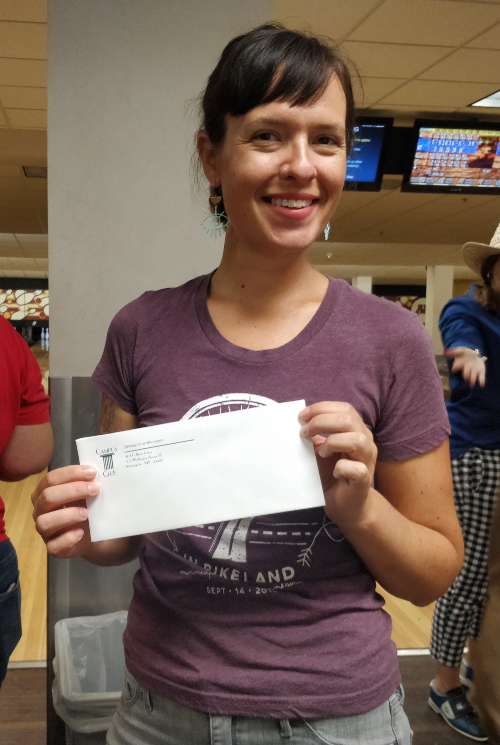





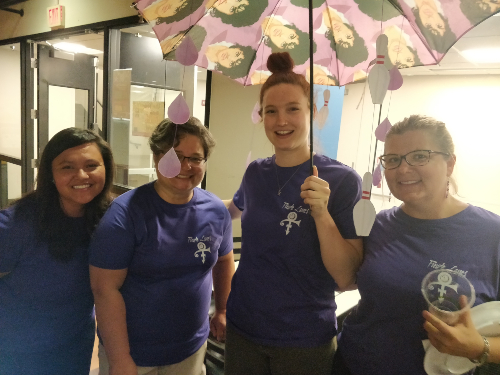

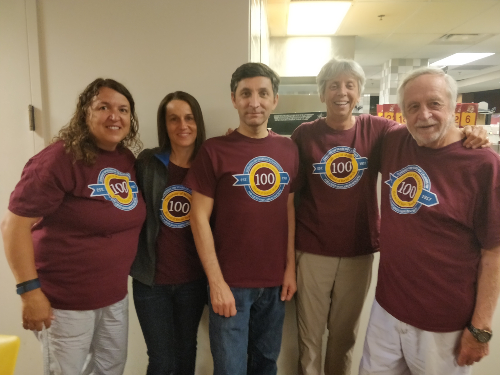
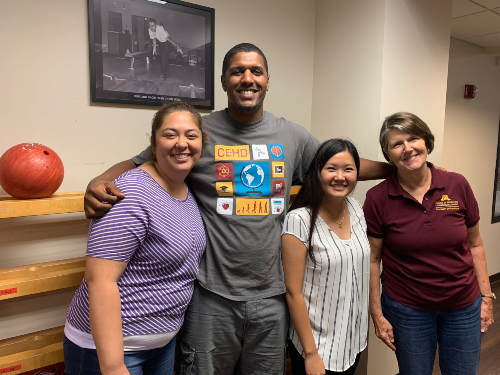
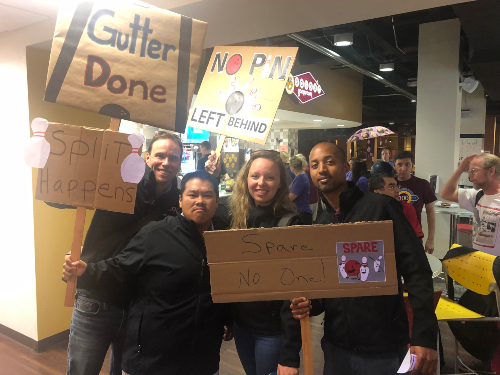
New CPAC members and P&A senators announced
The CEHD Professional and Administrative Council (CPAC) has announced two new members. They are Susan Diekman from CEHD communications and marketing and Alyssa Meuwissen from the Institute of Child Development. Other CPAC members include Christen Christopherson of student services; Colleen Clements of the Department of Curriculum and Instruction (C&I); Jane Fields of the Center for Applied Research and Educational Improvement; Milena Gebremeskel of the School of Social Work; Annie Hanson-Burke of the Department of Educational Psychology; Alissa Jones of the Department of Organizational Leadership, Policy, and Development (OLPD); Julie Michener of the Department of Family Social Science; and Darrell Peterson of the Institute on Community Integration (ICI).
CPAC members meet on the fourth Wednesday of each month. They work as advisors and collaborators for information related to P&A employment within the college. They also facilitate the P&A University Senate elections. New P&A senators include Anthony Albecker of the McNair Scholars Program (TRIO), Kathryn Silverstein of C&I, and Renata Ticha of ICI. Others senators include Ann Bailey of the Center for Early Education and Development and Gary Peter of OLPD.
CPAC announces development grant recipients
The CEHD Professional and Administrative Council (CPAC) has announced the recipients of its professional development grant for 2018-19. The grant is designed to offer P&A employees in CEHD funding for activities that will enhance their professional goals and work in CEHD. Examples of funded opportunities include attending conferences, workshops, and seminars; visiting a site to learn from another professional; and membership dues to an organization. Information on the 2019-20 grant application will be available in November. Once the application process is open, a college-wide email is sent. All P&A employees are invited to apply.
Current grant recipients include Barbara Billington of the Department of Curriculum and Instruction (C&I); Kristin Burger (C&I); Heather Cline of the Department of Family Social Science; Jennifer Hall-Lande of the Institute on Community Integration; Betsy Maloney Leaf (C&I); Anna Mraz of student services; Minerva Munoz of student services; Deb Ottman of the Center for Early Education and Development; Gary Peter of the Department of Organizational Leadership, Policy, and Development; Lana Peterson (C&I); Heidi Presslein of the School of Social Work (SSW); Elizabeth Marita Snyder (SSW); Jessica Thompson of student services; and Stacy Thompson of the Minnesota Center for Reading Research.
Collaboration will strengthen child welfare workforce

The Center for Advanced Studies in Child Welfare (CASCW) is currently formalizing its collaboration with the Minnesota Department of Human Services’ Child Safety and Permanency Division to enhance the professional development of Minnesota’s child welfare workforce.
The Minnesota Child Welfare Workforce Collaborative is a significant opportunity to increase Minnesota’s capacity to meet industry standards for training, education, and professional development across a broad range of professionals and community members working with families, tribes, and communities to ensure the safety of children and strengthening families. A statewide Child Welfare Training Academy will be developed and housed under the umbrella of “the Collaborative.” Recently funded by the Minnesota Legislature, the academy will deliver enhanced training and professional development opportunities across the state.
A part of CEHD’s School of Social Work, CASCW is the premier source of child welfare information and training in Minnesota. Its staff conducts and publishes research on a broad range of child welfare topics.
CEHD’s Open Textbook Network receives national grant to further its mission
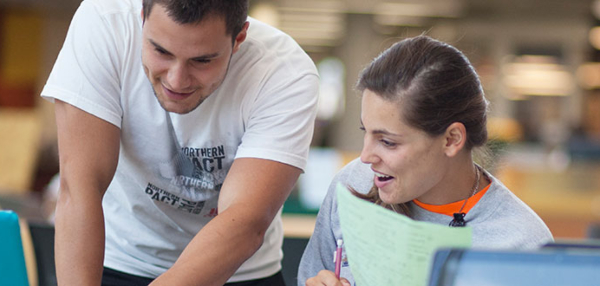
The CEHD-based Open Textbook Network (OTN) will now be able to help more faculty create their own open textbooks thanks to a National Leadership Grant for Libraries from the Institute of Museum and Library Services (IMLS). The grant will support a collaboration project led by OTN in partnership with the Collaborative Knowledge Foundation (Coko).
“A National Platform for Authoring Open Textbooks” seeks to lower barriers to textbook publishing by offering a modern publishing solution that is freely available to all. The IMLS grant will support this project in developing processes and tools to equip a broad community of authors to write and publish open textbooks.
The project will be informed by the OTN community and built on Coko’s Editoria software. Editoria is an open source, web-based, editing and production workflow tool. It provides structural support to help authors delineate and apply consistent instructional design across all elements of a textbook. It also provides collaboration functionality for faculty to work with authors, librarians, editors, peer reviewers, instructional designers, and other contributors who can help authors create quality textbooks.
“Academic libraries are working hard to support their faculty who want to publish open textbooks,” said David Ernst, executive director of the OTN. “We’re excited that this grant gives us the opportunity to work with the OTN community and Coko to build solutions that will make publishing accessible to more institutions and more faculty.”
OTN, an initiative of the CEHD’s Center for Open Education, is a community of higher education institutions working to advance open education by supporting the use, publication, and distribution of openly licensed textbooks. These programs leverage Open Educational Resources (OER), which are created and licensed to be freely distributed, used, and adapted. The resources can be downloaded for no cost, providing all students with free, continuous access to course materials. In addition, OER offer faculty the flexibility to customize the content to meet students’ learning needs. Since its inception in 2014, the network has grown to represent over 1,000 institutions.
Coko facilitates the creation of community-owned open infrastructure for research communication that fosters collaboration, increases transparency, and enables the production and dissemination of knowledge at greater speed. “I was very happy to work with David on this proposal and couldn’t be more pleased it has been successful,” said Coko Founder Adam Hyde. “OTN have a similar DNA to Coko–we are both mission oriented organizations which value openness in all its forms. These are the right two organizations to work on this problem and I think we can all expect to see great results.”
Dean’s office announces 9 new endowed chairs and professorships
The CEHD Dean’s Office has announced the names of nine faculty members who have been selected for endowed chairs and professorships effective July 1. They include:
Bodong Chen (Department of Curriculum and Instruction)—Bonnie Westby Huebner Chair in Education and Technology (new)
Panayiota Kendeou (Department of Educational Psychology)—Guy Bond Reading Chair (continuing)
Ann Masten (Institute of Child Development)—Irving Harris Professorship in Child Development (continuing)
Kristen McMaster (Department of Educational Psychology)—June and Phillip and Leo and Christine Stern Family Professorship Reading Success (new)
Marek Oziewicz (Department of Curriculum and Instruction)—Marguerite Henry Endowed Professorship for Children’s Literature (continuing)
Michael Rodriguez (Department of Educational Psychology)—Campbell Leadership Chair in Education and Human Development (continuing)
Amanda Sullivan (Department of Educational Psychology)—Birkmaier Educational Leadership Professorship (new)
Katie Thomas (Institute of Child Development)—William Harris Professorship (new)
Sashank Varma (Department of Educational Psychology)—Bonnie Westby Huebner Chair in Education and Technology (new)
Endowed appointments are made after the dean consults with the CEHD senior management team and academic unit leaderships. Professorships and chairs are primarily for faculty recognition of outstanding research, teaching, or service. Appointments are initially for a three-year term. At the conclusion of the appointment term, appointees may continue to hold the professorship or chair title for use as reference, which is consistent with other major University awards.
Faculty still serving their chair or professorship terms include:
Alexander (Sasha) Ardichvilli (Department of Organizational Leadership, Policy, and Development)—Hellervik Endowed Chair in Adult Career Development
Theodore Christ (Department of Educational Psychology)—Yackel Professorship in Educational Assessment and Measurement
Clayton Cook (Department of Educational Psychology)—John W. and Nancy E. Peyton Faculty Fellow in Child and Adolescent Wellbeing
Donald Dengel (School of Kinesiology)—Taylor-Leon Professorship in Exercise Science and Health Enhancement
Deborah Dillon (Department of Curriculum and Instruction)—Guy Bond Chair in Reading
Abi Gewirtz (Department of Family Social Science)—Lindahl Leadership Faculty Fund; funded via Royal and Virginia Anderson Strategic Initiatives
Wendy Haight (School of Social Work)—Gamble Skogmo Chair
Mary Jo Kane (School of Kinesiology)—Tucker Chair for Women and Girls in Sports, Exercise Science and Recreation
Muhammad Khalifa (Department of Organizational Leadership, Policy, and Development)—Robert Holmes Beck Chair of Ideas in Education
Bic Ngo (Department of Curriculum and Instruction)—Rodney Wallace Professorship for the Advancement of Teaching and Learning
Jean Quam (Dean’s Office)—Robert Holmes Beck Chair of Ideas in Education
Mistilina Sato (Department of Curriculum and Instruction)—Carmen Starkson Campbell Endowed Chair for Innovation in Teacher Development
Frank Symons (Department of Educational Psychology)—Birkmaier Educational Leadership Professorship
Philip Zelazo (Institute of Child Development)—Lindahl Professorship for Excellence in Teaching and Learning

